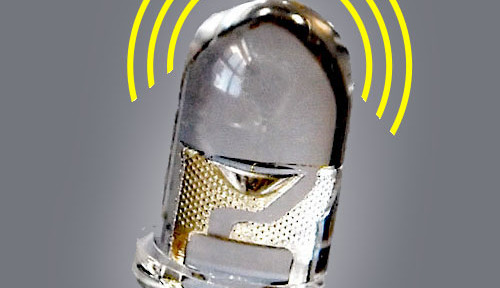Radio interference from LED light bulbs?
September 21, 2017
on
on

The German Amateur Radio Club (DARC) has issued a press release identifying domestic LED light bulbs as a source of electrical interference. The increasing popularity of these light sources has led to a significant increase in reports of radio traffic disturbance, interruption of radio services and even poor DAB reception. In their opinion, the electrically noisy LED lamps are a result of a bad government policy which simply ignores regulations applicable to EMC and the generation of EMI by electrical equipment.
According to DARC, the recommendations outlined in the regulations governing electromagnetic compatibility have simply been ignored. The result is that LED lamps currently on sale and in use generate considerable wideband RF interference. The German station Bavaria Radio has also pointed out the problem on its web page. Mains LED lamps employ an integrated switching controller to power the LEDs from the high-voltage mains supply. Poorly or cheaply designed controllers can emit wide-spectrum electromagnetic RF noise because of unsuppressed fast switching signal edges. There are also stand-alone "electronic transformers" for low-voltage halogen and LED lighting systems which use the same voltage transformation techniques and these are often wired to the lamps using long cables/antennae. Such poor-quality products should simply not be on sale. On top of that, in the urban environment we have also witnessed a growing use of large electronic advertizing hoardings and increasing use of LED traffic signals etc.
The resulting poor reception experienced by some radio listeners has caused them unwittingly to point the finger of suspicion at the manufacturer of their radio tuner. The German government minister responsible has underestimated the problem, stating that most future radio listening will take place via cable or satellite links which use more robust digital signals. The criticisms in the DARC paper target the current German government, which in its legislative procedure has rejected the recommendations of an expert independent investigation. According to DARC, the current Federal Government policy violates international law and the EU Charter.
According to DARC, the recommendations outlined in the regulations governing electromagnetic compatibility have simply been ignored. The result is that LED lamps currently on sale and in use generate considerable wideband RF interference. The German station Bavaria Radio has also pointed out the problem on its web page. Mains LED lamps employ an integrated switching controller to power the LEDs from the high-voltage mains supply. Poorly or cheaply designed controllers can emit wide-spectrum electromagnetic RF noise because of unsuppressed fast switching signal edges. There are also stand-alone "electronic transformers" for low-voltage halogen and LED lighting systems which use the same voltage transformation techniques and these are often wired to the lamps using long cables/antennae. Such poor-quality products should simply not be on sale. On top of that, in the urban environment we have also witnessed a growing use of large electronic advertizing hoardings and increasing use of LED traffic signals etc.
The resulting poor reception experienced by some radio listeners has caused them unwittingly to point the finger of suspicion at the manufacturer of their radio tuner. The German government minister responsible has underestimated the problem, stating that most future radio listening will take place via cable or satellite links which use more robust digital signals. The criticisms in the DARC paper target the current German government, which in its legislative procedure has rejected the recommendations of an expert independent investigation. According to DARC, the current Federal Government policy violates international law and the EU Charter.
Read full article
Hide full article



Discussion (18 comments)
Dean 7 years ago
James C Carrington 5 years ago
JOHN C. WALTON 7 years ago
Richard Bennett 7 years ago
G8LII-Jack 7 years ago
Bob Niemczyk 7 years ago
We also replaced ALL of the bulbs in the house with LEDs. I am now wondering if my WiFi reception issues are related to this also.
Yes, this is an issue.
EA4DUT 7 years ago
Larry Strasser 7 years ago
DARRELL NORQUAY 7 years ago
MG
Jorolv Arnekleiv 7 years ago
ARVO TANNER 7 years ago
tony1tf 7 years ago
That's a great idea. I wonder what ferrite chokes you have been using. I realise I should have picked up a bag full at the amateur radio rally at Newark in the UK over the weekend. Perhaps Elektor could do some tests on light fittings and find out how much the emissions are reduced with snap-on chokes.
Tony
David R Jones 7 years ago
RICHARD DELAURELL 7 years ago
ALAN WOODMAN 7 years ago
Steve Macdonald 6 years ago
It is astonishing that these products are being sold and installed in the UK - or anywhere else where appliances are supposed be EMC compliant.
Sadly, only a minority of spectrum users care about minimising spectrum pollution. So long as these poorly designed and/or installed appliances are not interfering with essential services and most people's WiFi, cell phones, FM, DAB radio, satellite TV etc. I don't expect any government agency is going to do anything about it - even if regulations/laws are being broken. Only when, for example, mobile phones become useless en masse due to the rising quagmire of RF garbage in the ether will action have to be taken?
Chris-H 5 years ago
Testing needs to be made much more rigorous, and there should be no exemptions whatsoever for devices from certain countries (some European countries allow all Chinese goods through without safety testing, for example). Any failures need to be banned from sale.
It is actually worth modifying your lighting circuits to operate at lowered voltages. I got a large supply of 12V 4A secondary mains transformers (widely used when traffic lights were using halogen lamps). I got a supply of 12V AC LED lamps - problem solved. Really electrically quiet lighting!
The next step will be to develop a linear Power Supply for my computers......
I0SJX 5 years ago